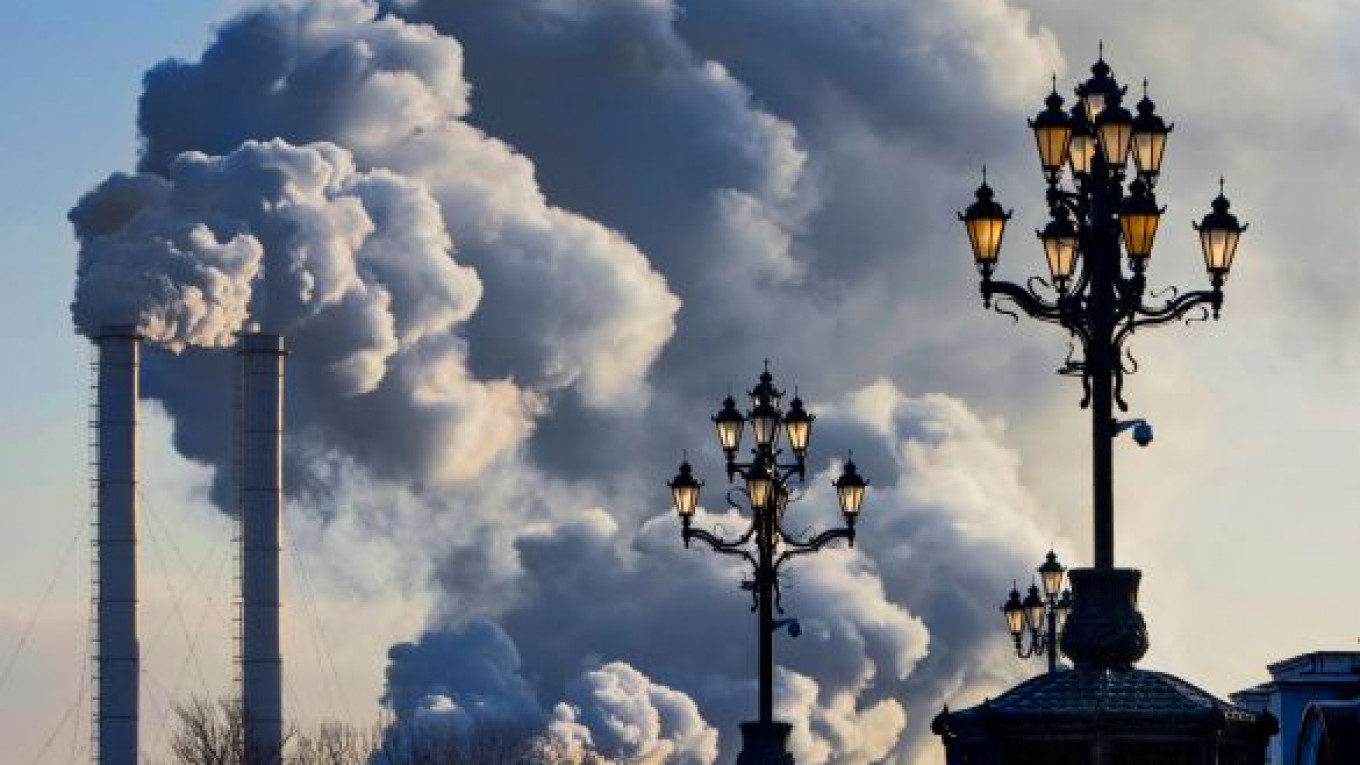Russia could have one of the most carbon-intensive economies or the least — but it is almost impossible to tell, because Russian companies reveal less emissions data than anyone else, ranking behind China, India and Brazil, according to a global study released Tuesday.
Of about 35 Russian companies surveyed in the carbon-ranking report, only TNK-BP actually reported complete and independently verified data on carbon emissions.
Of the 16 Russian companies that rank among 800 global majors, not a single one submitted complete data.
The performance makes Russia the least transparent of the 17 countries with 10 or more companies in the top 800, and a rival with China in worst performance among the BRICS countries.
The London-based Environmental Investment Organization, which compiled the rankings, hopes the lists will help investors direct their money to the cleanest firms.
"But we can only do that with transparency. So our first question is, 'Is there data?' Then we ask, 'Is it complete?' and 'Has it been verified?'" said Sam Gill, operational director of the EIO.
TNK-BP's transparency earned it a relatively high rank of 23 out of 300 of the largest companies by free-floating capitalization in Brazil, Russia, India, China and South Africa — despite being one of the largest net emitters in the BRICS countries, with an estimated 3,027.9 tons of carbon dioxide released per million dollars of turnover.
It is followed by RusHydro (78), Novolipetsk Steel (86) and Tatneft (89), each of which reported only incomplete data.
Inter RAO UES, which reported no carbon data at all, was ranked one of the worst-performing companies in the world. It was ranked 797, with an inferred carbon intensity of 10,287.39 tons of CO2 per million dollars of turnover — just ahead of three U.S. utilities companies that came last.
The Federal Grid Company, which did not qualify for the Global 800, came in at 296 — one place below Inter RAO — in the BRICS rankings.
The ET Global Carbon Rankings, which aims to help investors assess the carbon footprint of traded companies, looked at carbon emissions of the world's largest companies by market capitalization.
Researchers ranked companies based on their disclosure of three kinds of carbon emissions — through day-to-day operations, electricity consumption and indirect footprint, such as waste, employee commuting and end-products.
TNK-BP is an interesting case because BP itself is ranked as incomplete, Gill said. "Ernst & Young, who did the verification [of BP's emissions data], note that BP accounted for everything except its Russian operations and emissions connected to the Gulf of Mexico oil spill," he said by phone from London.
Inter RAO UES and TNK-BP were not immediately available for comment Tuesday.
Tilting at Windmills
LUKoil's renewable energy arm, LUKoil Ecoenergy, is considering buying wind farms in Bulgaria via its joint venture with Italy's ERG Renew, Interfax reported Tuesday.
But investment in Russia itself is still stymied by lack of legal support, industry figures said Tuesday.
"There's a rule book as thick as a bible [for connecting a power station to the grid], but it makes no mention of wind-energy generators," said Anatoly Kopylov, vice president of the Russian Wind Power Council at a conference Tuesday.
Renewables could produce as much as 25,000 megawatts of Russia's electricity by 2020 if laws are introduced to regulate connection of wind farms to the national grid, he said. Wind farms connected to the grid currently produce just 5.5 megawatts.
The failure of UN climate talks to clarify the future of the Kyoto Protocol and its market-based mechanisms could dry up investment in the carbon offset market, possibly threatening prices that are already trading near record lows, Reuters reported Monday.
A legally binding pact is unlikely to be agreed at the climate summit in Durban, South Africa, which starts Nov. 28. Russia, Japan, Canada and others will not sign up to a second commitment period unless it includes all major emitters. China, India and others refuse to take on binding targets after 2012 unless all developed nations, including the United States, which never ratified Kyoto, not only sign up to a new pact but make much deeper emission cuts than already pledged.
A Message from The Moscow Times:
Dear readers,
We are facing unprecedented challenges. Russia's Prosecutor General's Office has designated The Moscow Times as an "undesirable" organization, criminalizing our work and putting our staff at risk of prosecution. This follows our earlier unjust labeling as a "foreign agent."
These actions are direct attempts to silence independent journalism in Russia. The authorities claim our work "discredits the decisions of the Russian leadership." We see things differently: we strive to provide accurate, unbiased reporting on Russia.
We, the journalists of The Moscow Times, refuse to be silenced. But to continue our work, we need your help.
Your support, no matter how small, makes a world of difference. If you can, please support us monthly starting from just $2. It's quick to set up, and every contribution makes a significant impact.
By supporting The Moscow Times, you're defending open, independent journalism in the face of repression. Thank you for standing with us.
Remind me later.






